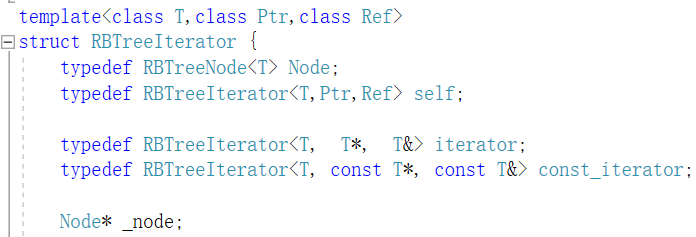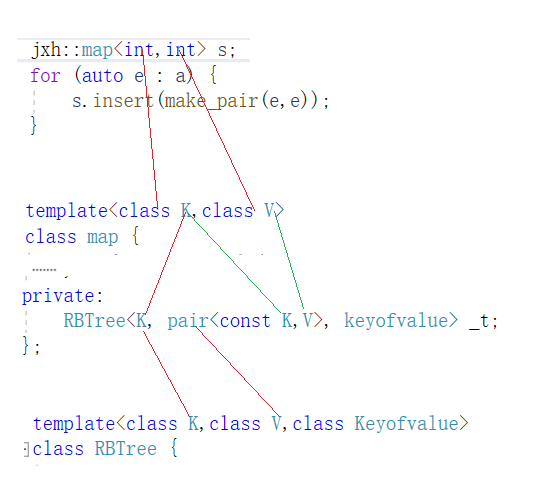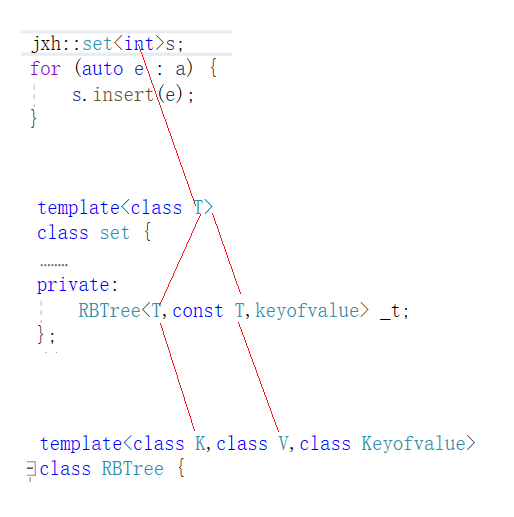【C++】用红黑树封装map和set
我们之前学的map和set在stl源码中都是用红黑树封装实现的,当然,我们也可以模拟来实现一下。在实现之前,我们也可以看一下stl源码是如何实现的。我们上篇博客写的红黑树里面只是一个pair对象,这对于set来说显然是不合适的,所以要想让一个红黑树的代码同时支持map和set,就用上模板就可以了
我们来看看stl源码中是如何实现的
前两个模板参数是两个类型,就是我们要在set或map中放入什么
set不是只需要放入一个吗?所以,set在传参数的时候是这么传的
它的前两个传的全是Key,它这么实现还是为了兼容map,map传的是什么呢?我们再来看一下
传的一个是Key,一个是pair类的对象。那pair中不是已经有Key了吗,为什么还要传Key呢?因为一个最简单的原因之一find函数的参数是Key。
那么看第三个模板参数keyofvalue,传这个类型是为了从value中找到key,因为我们树这个类传给节点类的时候只传了value,如下图:
因为map中value是一个pair对象,set中value就是key,它们的获取方式不一样,所以传这个参数是为了实现仿函数,来取出key值用于比较。
那么了解了这个大体的结构之后,下一个就是要实现我们的迭代器了,我们其实可以在红黑树中实现一个树形的迭代器,然后map和set再封装一层就行了,其实我们的迭代器就是一个类,它用来实现类似于指针的一些操作,所以我们就用指针来当作这个类的成员变量,在这个类的基础上实现迭代器的功能。
在实现迭代器的时候,最关键的一个函数就是重载++,这里迭代器++肯定是按中序,因为这样才有意义,有顺序,那么我们如何通过一个节点找到它的中序遍历的下一个节点呢?这其实是有规律的。比如我们看这样一颗红黑树
首先我们中序遍历是左子树 根 右子树
1.假设这个节点有右子树,那么这个节点之后就是它的右子树的中序的第一个节点,就是右子树中最左边的节点
2.假设这个节点没有右子树,那么走完这个节点以后以这个节点为根的树就走完了,假如它是它父亲的左孩子,那么就该走它的父亲,如果它是它父亲的右孩子,那么它父亲也走完了,就按照此规律走它的爷爷。
有了这个理论基础,我们就可以来实现了。
同样--的话跟++是完全相反的,反过来的遍历顺序就是右子树,根,左子树,然后我们再分别去看这棵树有没有左子树,如果有,那就走左子树中第一个该走的节点,就是左子树中最右节点;如果没有,那就看它是它父亲的什么节点,一直往上找,直到找到它是它父亲的右子树的节点,它父亲就是下一个要遍历的节点。
下面还有一些细节问题,比如说把迭代器写成模板
那么只需要传不同的类型就可以实现const或非const的迭代器
我们const对象要用const版本的迭代器,因为const对象用普通版本的属于权限放大,所以我们要设计const版本的迭代器
我们也要对红黑树的插入函数进行修改,原来插入函数返回一个bool值,但是库中应该是返回一个pair对象,其中first是个迭代器,second是个bool值表示是否新插入
看到这样的代码的时候,这个typename表示后面是一个类型名,因为static静态成员也可以指明类域然后去访问
另外,我们这里为什么传const K呢?因为就算是普通的迭代器我们也不希望key值改变,因为map的key值改了就不满足二叉搜索树了
这是如何使用const_iterator,首先s就是一个普通的map对象,就调用普通版本的begin()
调完之后它返回一个iterator,而我们用的const_iterator去接收的,所以要写个构造函数,用普通迭代器构造出const迭代器
那么下面我们再整体的来展示一下红黑树和map set之间的封装关系
这就是如何用红黑树封装出map和set,下面是所有的代码
RBTree.h
#include<iostream>
#include<assert.h>
using namespace std;
enum col {
RED,
BLACK
};
template<class T>
struct RBTreeNode {
RBTreeNode(const T& data)
:_left(nullptr)
,_right(nullptr)
,_parent(nullptr)
,_data(data)
,_col(RED){}
RBTreeNode* _left = nullptr;
RBTreeNode* _right = nullptr;
RBTreeNode* _parent = nullptr;
T _data;
col _col=RED;
};
template<class T,class Ptr,class Ref>
struct RBTreeIterator {
typedef RBTreeNode<T> Node;
typedef RBTreeIterator<T,Ptr,Ref> self;
typedef RBTreeIterator<T, T*, T&> iterator;
typedef RBTreeIterator<T, const T*, const T&> const_iterator;
Node* _node;
RBTreeIterator(const iterator& it)
:_node(it._node) {}
RBTreeIterator(Node*node)
:_node(node){}
Ref operator*() {
return _node->_data;
}
Ptr operator->() {
return &_node->_data;
}
bool operator==(const self&s) {
return _node == s._node;
}
bool operator!=(const self& s) {
return _node != s._node;
}
self& operator++() {
if (_node == nullptr) {
cout << "end()不能++" << endl;
assert(false);
}
if (_node->_right) {//有右子树,那么这个节点之后就是它的右子树的中序的第一个节点,就是右子树中最左边的节点
_node = _node->_right;
while (_node->_left != nullptr)_node = _node->_left;
return *this;
}
else {//没有右子树,直到找到孩子是父亲左子树的那个父亲节点
Node* parent = _node->_parent;
while (parent && _node != parent->_left) {
parent = parent->_parent;
_node = _node->_parent;
}
_node = parent;
return *this;
}
}
self& operator--() {
if (_node->_left) {
_node = _node->_left;
while (_node->_right != nullptr)_node = _node->_right;
return *this;
}
else {
Node* parent = _node->_parent;
while (parent && _node != parent->_right) {
parent = parent->_parent;
_node = _node->_parent;
}
_node = parent;
return *this;
}
}
};
template<class K,class V,class Keyofvalue>
class RBTree {
typedef RBTreeNode<V> Node;
public:
typedef RBTreeIterator<V,V*,V&> iterator;
typedef RBTreeIterator<V,const V*,const V&> const_iterator;
const_iterator begin()const {
Node* cur = _root;
while (cur && cur->_left)cur = cur->_left;
return const_iterator(cur);
}
iterator begin() {
Node* cur = _root;
while (cur&&cur->_left)cur = cur->_left;
return iterator(cur);
}
const_iterator end()const {
return const_iterator(nullptr);
}
iterator end() {
return iterator(nullptr);
}
iterator Find(const K& key) {
Keyofvalue kov;
Node* cur = _root;
while (cur) {
if (kov(cur->_data) < key) {
cur = cur->_right;
}
else if (kov(cur->_data) > key) {
cur = cur->_left;
}
else {
return iterator(cur);
}
}
return end();
}
pair<iterator,bool> insert(const V& data) {
if (_root == nullptr) {
_root = new Node(data);
_root->_col = BLACK;
return make_pair(iterator(_root),true);
}
Node* cur = _root;
Node* parent = nullptr;
Keyofvalue kov;
while (cur) {
if (kov(cur->_data) < kov(data)) {
parent = cur;
cur = cur->_right;
}
else if (kov(cur->_data) > kov(data)) {
parent = cur;
cur = cur->_left;
}
else return make_pair(iterator(cur),false);
}
cur = new Node(data);
Node* ret = cur;
if (kov(parent->_data) < kov(cur->_data)) {
parent->_right = cur;
cur->_parent = parent;
}
else {
parent->_left = cur;
cur->_parent = parent;
}
Node* c = cur;
Node* p = cur->_parent;
Node* g = p->_parent;
Node* u = nullptr;
while (p && p->_col == RED) {
if (p == g->_left)u = g->_right;
else u = g->_left;
if (u == nullptr || u->_col == BLACK) {
if (p == g->_left && c == p->_left) {
RotateR(g);
p->_col = BLACK;
g->_col = RED;
}
else if (p == g->_right && c == p->_right) {
RotateL(g);
p->_col = BLACK;
g->_col = RED;
}
else if (p == g->_left && c == p->_right) {
RotateL(p);
RotateR(g);
c->_col = BLACK;
g->_col = RED;
}
else if (p == g->_right && c == p->_left) {
RotateR(p);
RotateL(g);
c->_col = BLACK;
g->_col = RED;
}
else assert(false);
break;
}
else if (u->_col == RED) {
p->_col = BLACK;
u->_col = BLACK;
g->_col = RED;
if (g == _root) {
g->_col = BLACK;
break;
}
else {
c = g;
p = c->_parent;
g = p->_parent;
}
}
else assert(false);
}
return make_pair(iterator(ret),true);
}
void RotateL(Node* parent) {
Node* subR = parent->_right;
Node* subRL = subR->_left;
Node* ppnode = parent->_parent;
if (subRL)subRL->_parent = parent;
parent->_right = subRL;
subR->_left = parent;
parent->_parent = subR;
if (parent == _root) {
_root = subR;
subR->_parent = nullptr;
}
else {
subR->_parent = ppnode;
if (ppnode->_left == parent)ppnode->_left = subR;
else ppnode->_right = subR;
}
}
void RotateR(Node* parent) {
Node* subL = parent->_left;
Node* subLR = subL->_right;
Node* ppnode = parent->_parent;
if (subLR)subLR->_parent = parent;
parent->_left = subLR;
subL->_right = parent;
parent->_parent = subL;
if (parent == _root) {
_root = subL;
subL->_parent = nullptr;
}
else {
subL->_parent = ppnode;
if (ppnode->_left == parent)ppnode->_left = subL;
else ppnode->_right = subL;
}
}
Node* getroot() {
return _root;
}
private:
Node* _root = nullptr;
};MySet.h
namespace jxh {
template<class T>
class set {
typedef RBTreeNode<T> Node;
struct keyofvalue {
const T& operator()(const T&key) {
return key;
}
};
void _inorder(Node* root) {
if (root == nullptr)return;
_inorder(root->_left);
cout << root->_data << endl;
_inorder(root->_right);
}
public:
typedef typename RBTree<T, const T, keyofvalue>::iterator iterator;
typedef typename RBTree<T, const T, keyofvalue>::const_iterator const_iterator;
iterator begin()
{
return _t.begin();
}
iterator end()
{
return _t.end();
}
const_iterator begin()const
{
return _t.begin();
}
const_iterator end()const
{
return _t.end();
}
pair<iterator, bool> insert(const T& key)
{
return _t.insert(key);
}
iterator find(const T& key)
{
return _t.find(key);
}
void inorder() {
_inorder(_t.getroot());
}
private:
RBTree<T,const T,keyofvalue> _t;
};MyMap.h
namespace jxh {
template<class K,class V>
class map {
typedef RBTreeNode<pair<K,V>> Node;
struct keyofvalue {
const K& operator()(const pair<K,V>& kv) {
return kv.first;
}
};
void _inorder(Node* root) {
if (root == nullptr)return;
_inorder(root->_left);
cout << root->_data.first<<" "<<root->_data.second << endl;
_inorder(root->_right);
}
public:
//typedef RBTreeIterator<pair<K,V>> iterator;
typedef typename RBTree<K, pair<const K, V>, keyofvalue>::iterator iterator;
typedef typename RBTree<K, pair<const K, V>, keyofvalue>::const_iterator const_iterator;
const_iterator begin()const {
return _t.begin();
}
const_iterator end() const{
return _t.end();
}
iterator begin() {
return _t.begin();
}
iterator end() {
return _t.end();
}
pair<iterator, bool> insert(const pair<K, V>& kv)
{
return _t.insert(kv);
}
iterator find(const K& key)
{
return _t.find(key);
}
V& operator[](const K& key)
{
pair<iterator, bool> ret = insert(make_pair(key, V()));
return ret.first->second;
}
void inorder() {
_inorder(_t.getroot());
}
private:
RBTree<K, pair<const K,V>, keyofvalue> _t;
};原文地址:https://blog.csdn.net/2201_76024104/article/details/137474599
免责声明:本站文章内容转载自网络资源,如本站内容侵犯了原著者的合法权益,可联系本站删除。更多内容请关注自学内容网(zxcms.com)!

















